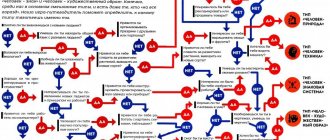Giftedness is a special level of development of personal abilities in psychology. Today, there is constant interest in the issue of giftedness, both in the field of science and in society. And famous people who are considered geniuses are not always truly brilliant from a scientific point of view. Even Alexander the Great, whom the average person would probably consider a genius, was unlikely to be one; he was just a successful student of the true genius Aristotle. And today this is often the result not of personal abilities, but of the help of behind-the-scenes forces - coaches, trainers, PR people, a whole team of professionals. Without it, a person cannot be so exceptionally successful in his business.
Giftedness is a phenomenon known even to children. They were asked what they knew about giftedness, and this is what they answered: “Giftedness is a talent when you are very good at something.” “Giftedness is when a person has a special gift, such as singing.” This understanding corresponds to the everyday concept of giftedness in adults. However, how does science reveal the concept of giftedness?
Giftedness in psychology is a property that allows its owner to achieve extraordinary results in activities. This can apply to one or several areas of life in which a person can be gifted at the same time. A bright, extremely rare talent, when a person differs so significantly from others in his performance results that he makes a breakthrough in an area of interest to him or even in several, is called genius.
Abilities and their types
Abilities are a complex formation, a set of very different qualities of a person that give him the opportunity to achieve success in a certain activity. It is the opportunity, but whether this potential opportunity becomes a reality, depends on the hard work, perseverance and determination of the individual.
Abilities are formed and developed throughout life. There are cases when people achieved success in painting, literature, and invention at a fairly mature, or even old age.
The basis of abilities are natural inclinations, which are congenital (but not necessarily hereditary) in nature, for example:
- ear for music;
- high sensitivity to color discrimination;
- large lung capacity;
- increased activity of the right or left hemisphere of the brain, etc.
It is difficult to achieve success without the inclinations, but a person’s natural qualities do not guarantee it. Inclinations can develop into abilities only in the process of mastering an activity, systematic study and hard work.
Along with special abilities associated with a specific activity and manifested in it, there are also general abilities, primarily cognitive. You cannot do without them in any activity. A person with a low level of intelligence or poor memory will not be able to become an outstanding composer even if he has a phenomenal ear for music. The level of general abilities determines the efficiency and speed of obtaining, storing and processing information and the effectiveness of human interaction with the environment, including society.
This is a set of inclinations that presuppose a high level of general abilities, most often called giftedness.
Thinking outside the box
It is known that most people strive to be like everyone else. They are afraid of appearing abnormal and strange to others. This is why people, as a rule, refuse to have their own opinions and obey the herd mentality. All this literally ruins wonderful careers, prevents talent from developing, and diminishes existing achievements and ambitions. People do not strive to address their “I”. They waste time reading educational books and prefer idle activities in their free time. But if a person has the ability to think outside the box, then this significantly changes his perception of the world around him. It allows individuality to grow and develop. A person gets the opportunity to get closer to himself and realize his own worth.
Giftedness and its role in human life
In psychology, there is no consensus on what giftedness is, and most often this concept is used in pedagogy. There, giftedness is considered as a complex of personality qualities that contributes to the successful acquisition of knowledge and the development of skills in educational activities.
In psychology, there are several points of view on the essence of this concept, but most often giftedness is associated with cognitive abilities: attention, memory, thinking, imagination and creativity. The concept of “giftedness” thus includes the following individual characteristics:
- observation and high level of concentration;
- the ability to quickly and often spontaneously remember diverse information;
- free access to information stored in memory and, as a result, associative thinking;
- flexible thinking, capable of operating with concepts and categories from different fields of knowledge;
- high level of logical thinking;
- developed imaginative thinking and imagination;
- the ability to think original, creatively and find non-standard solutions to problems.
Thus, giftedness provides a person with the opportunity to master various types of activities, but this opportunity is potential, since special abilities are also necessary for success. Although, given that giftedness presupposes a penchant for creativity and significant general activity, a person with a high level of this characteristic will always find an area of self-realization and an area where he can achieve success. And a number of psychologists also identify special talent associated with special abilities.
Fast development
What does the concept of giftedness include at an early age? A gifted child first appears between three and five years of age. This is the time when the formation of his personality takes place. The baby begins to realize his abilities and talents, realizing that he is doing something very well. The child, comparing himself with his peers, begins to realize that he is different from them.
A clear sign of giftedness is progressive development. If a child at 3-4 years old can already read syllables, then you should pay special attention to him. After all, this child has his own rhythm of life, and soon he will no longer be interested in communicating with his peers. He will reach out to older children or adults. With an ever-increasing pace of development, we can talk about genius.
Talent as a natural gift and level of ability
You can often hear the expression: “He was given talent by God.” The assessment of talent as a kind of gift is connected, of course, with the desire to somehow justify one’s own “talentlessness” - if it’s not given, it’s not given. But there is a certain amount of truth in this statement.
Talent is a very high level of special abilities and, indeed, it is not given to everyone. Talent is based on inclinations - natural qualities, a person’s innate predisposition to a certain activity. It most often manifests itself in anatomical, physiological or psychophysiological features:
- ear for music;
- sensitivity of the visual analyzer;
- activity of the center of mathematical abilities in the cerebral cortex;
- speed of mental reactions, etc.
All this creates conditions for potential success in activity. But you still need to master this activity, and not at an average level, but at the level of mastery - only then will people talk about your talent.
That is, although talent presupposes natural data, it is, first of all, work, perseverance in mastering techniques, methods of activity, the process of developing and improving abilities. Even if a person was born with excellent inclinations, but does not show perseverance and hard work in developing his abilities, he will not achieve success; at best, he will become a strong average peasant, an artisan, and not a master. This is what they usually say about such people: “I buried my talent in the ground.”
But, one way or another, talent is a fairly common phenomenon; moreover, almost all children are born potentially talented. And it depends only on upbringing and your own perseverance whether potential talent will turn into real talent.
But genius is a phenomenon of a completely different order, although it is also related to the level of abilities. But we can say that genius goes beyond the upper limit of the mental norm, and therefore is extremely rare.
Superpowers or gifts? Learn from the superhumans themselves about their powers.
Desire to know
It doesn’t matter what area a person turns his attention to - music, dancing or reading. The main thing is the desire to do something
Moreover, be sure to devote most of your time to your occupation. The desire to learn becomes a source of courage and enthusiasm, the desire to take risks and implement the most, at first glance, incredible ideas. All this fills the individual with new energy and brings him happiness.
What is genius
When we say that genius goes beyond the norm, we do not mean pathology or illness, but the fact that the abilities of a genius significantly exceed a certain standard norm accepted in society. This allows geniuses not only to achieve success, often in several types of activities, but also to influence the very course of development of human civilization.
A talented person differs from a simply capable person quantitatively - in the level of development of abilities, but a genius differs qualitatively.
Highest level of human ability
Characteristics of a genius:
- unusual perception of the environment;
- out-of-the-box thinking;
- the highest level of creativity.
Moreover, spontaneous creativity, when new, original ideas are born as if on their own, and intuitive thinking is ahead of rational thinking.
No less important is such a quality of genius as interest, passion, often turning into obsession. Brilliant people are often interested in different fields and types of activities, and are able to achieve success everywhere not only thanks to their giftedness and talent, but also to their tremendous hard work, perseverance, and determination. For the sake of new knowledge or mastering a new activity, a genius can sacrifice many things, including his own health and the well-being of loved ones.
Geniuses have the ability of scientific foresight not only due to their analytical abilities, but also because they themselves were in many ways ahead of their time, and their discoveries and creations seemed to be taken from the future.
The basis of genius is a very high level of giftedness and talent, which is manifested in various types of activities. It would seem that a genius is capable of achieving success in everything. For example:
- Leonardo da Vinci was not only an artist, but also an architect and an outstanding inventor, whose ideas were hundreds of years ahead of his time.
- Giordano Bruno is known not only as a brilliant astronomer who expressed ideas that were incomparable with the level of development of science of that time, but as a poet and philosopher.
- Johannes Kepler, who discovered the laws of motion of the planets of the solar system, became famous as a famous mathematician, mechanic and optician.
- The outstanding philosopher Rene Descartes was also the creator of analytical geometry, a physicist and even a physiologist. By the way, the Russian physiologist I.P. Pavlov considered him his predecessor.
- One of the brightest Russian geniuses, Mikhailo Lomonosov, showed abilities in very different fields: in poetry and mechanics, chemistry and history, painting and metallurgy, geography and astronomy.
Reading about geniuses, you understand that these are people who are clearly outside the norm. But how abnormal are they?
Tendency to solitude
Gifted people, such as artists and writers, are known to become completely self-absorbed. This happens because a creative person needs to have a certain personal space.
It allows you to slowly think about your plans and analyze what is happening. A person deprived of such a perspective ceases to feel safe. He regains a sense of comfort only after receiving peace and quiet, which allows great masterpieces to be born.
Is it good to be gifted?
Of course, a child’s development cannot be limited only to the family. But not every type of giftedness is related to school and finds conditions for development there. For example, the so-called social (leadership) talent, for obvious reasons, is not always encouraged by teachers and even parents. They simply don't know what to do with such children.
Early manifested talent in the arts (musical, artistic, acting) or in sports probably has no direct relation to school either. Often such a child does not feel very comfortable at school: due to constant employment, he communicates less with classmates, and often misses classes due to concerts or competitions. Such children often have emotional problems due to high competition with other children in their “specialty.”
Who is a gifted child?
A gifted child is a child who stands out for his bright, obvious, sometimes outstanding achievements (or has internal prerequisites for such achievements) in a particular activity.
Today, most psychologists recognize that the level, qualitative originality and nature of the development of giftedness are always the result of a complex interaction between heredity (natural inclinations) and the social environment. At the same time, the role of psychological mechanisms of personality self-development cannot be ignored.
Some psychologists believe that gifted children in a regular school do not receive proper understanding from adults and peers, and are subject to ridicule and almost bullying.
Among modern concepts of giftedness, the theory of the famous American specialist in the field of studying gifted children, Joseph Renzulli, can be called the most popular. In his opinion, giftedness is a complex result of the superposition of 3 factors:
- above average abilities
- creativity,
- involvement in the task.
Favourite buisness
Very rarely do children, even as teenagers, think about what they want to do in life. But this does not at all apply to someone who is gifted. Such children already have plans for the future in elementary school. They don’t need adult advice, because it will only lead them astray.
Having a child’s own business is a sure sign of his talent. It is important for adults to pay attention to this and begin to develop the activities of the little person that he likes.
Love of reading
Today there are few children who enjoy reading fiction. Their books remain unclaimed. But the concept of giftedness in children necessarily implies a love of reading.
For such a child, a book is an opportunity to participate in an exciting adventure, full of amazing discoveries and mysterious secrets. If there is such a sign of giftedness, parents need to do their best to support it in their child.
The desire for self-expression
Gifted children do their best to demonstrate their own position. From an early age, they defend their point of view and want their opinion to be listened to. It is also important for them to be recognized, since talent certainly strives for self-expression. Such children will never hide from people what they really think, even if they remain misunderstood by others. By the age of 3-5, such a child is a bright individual. And adults cannot impose their opinion or force him to do anything. All this speaks of the little person’s self-sufficiency, which finds expression in stubbornness.
How to Identify Extraordinary Opportunities
We recommend: Autism: what is it?
Diagnosis of giftedness involves the use of standardized tests. They allow you to assess the nature, degree of expression and type of giftedness. Such techniques can be used not only by psychologists and teachers, but also by parents.
The key difference between diagnostic methods is their focus on the child’s age. For example, using the “Gifted Map” method, you can determine abilities and evaluate them in children 5-10 years old. The “Gifted Card” consists of 80 questions that relate to a certain extent different characteristics of the child (his activities, behavior). Responses are assessed on a scale from 1 to 4, which allows, simultaneously with diagnostics, to give a forecast of probable abilities.











